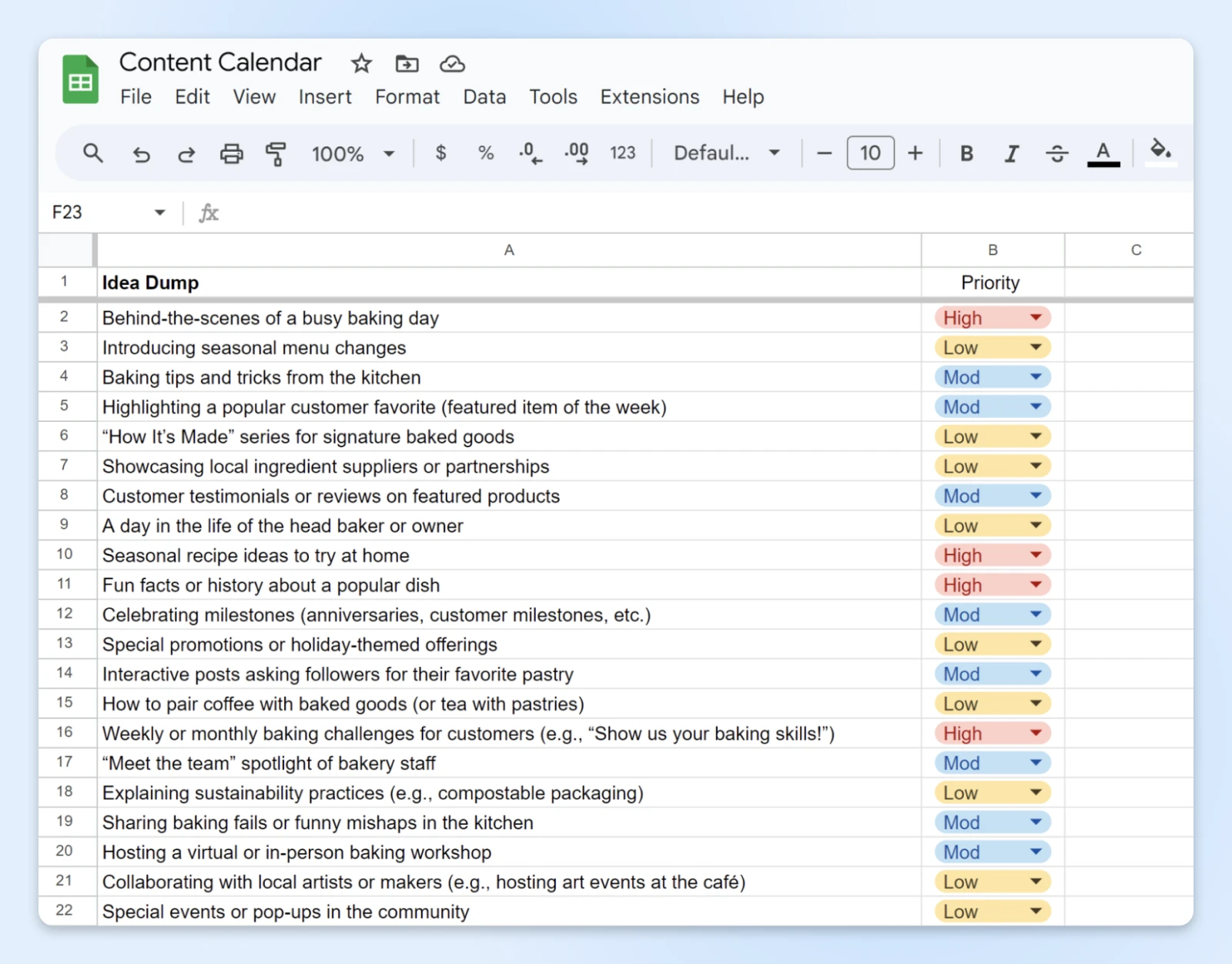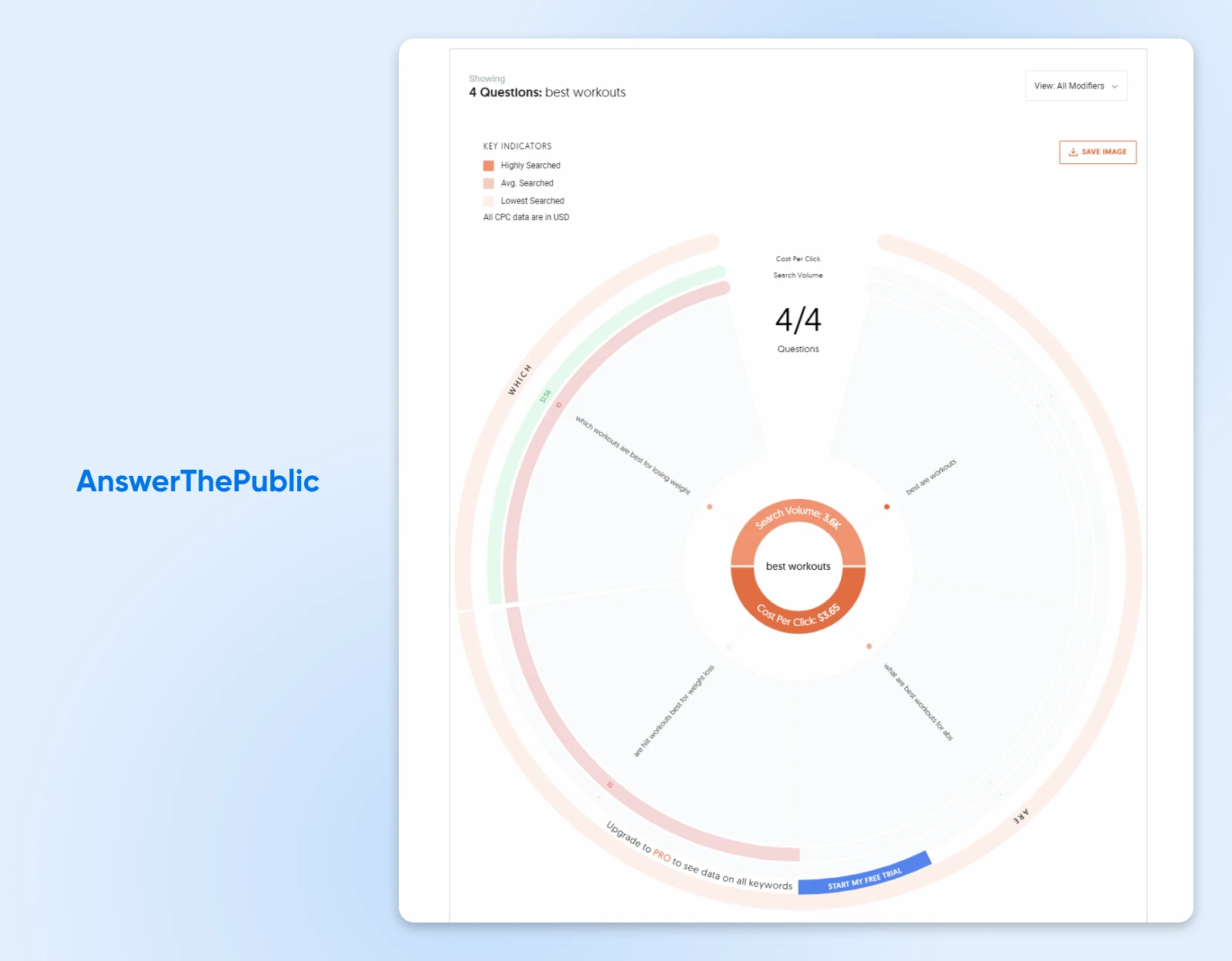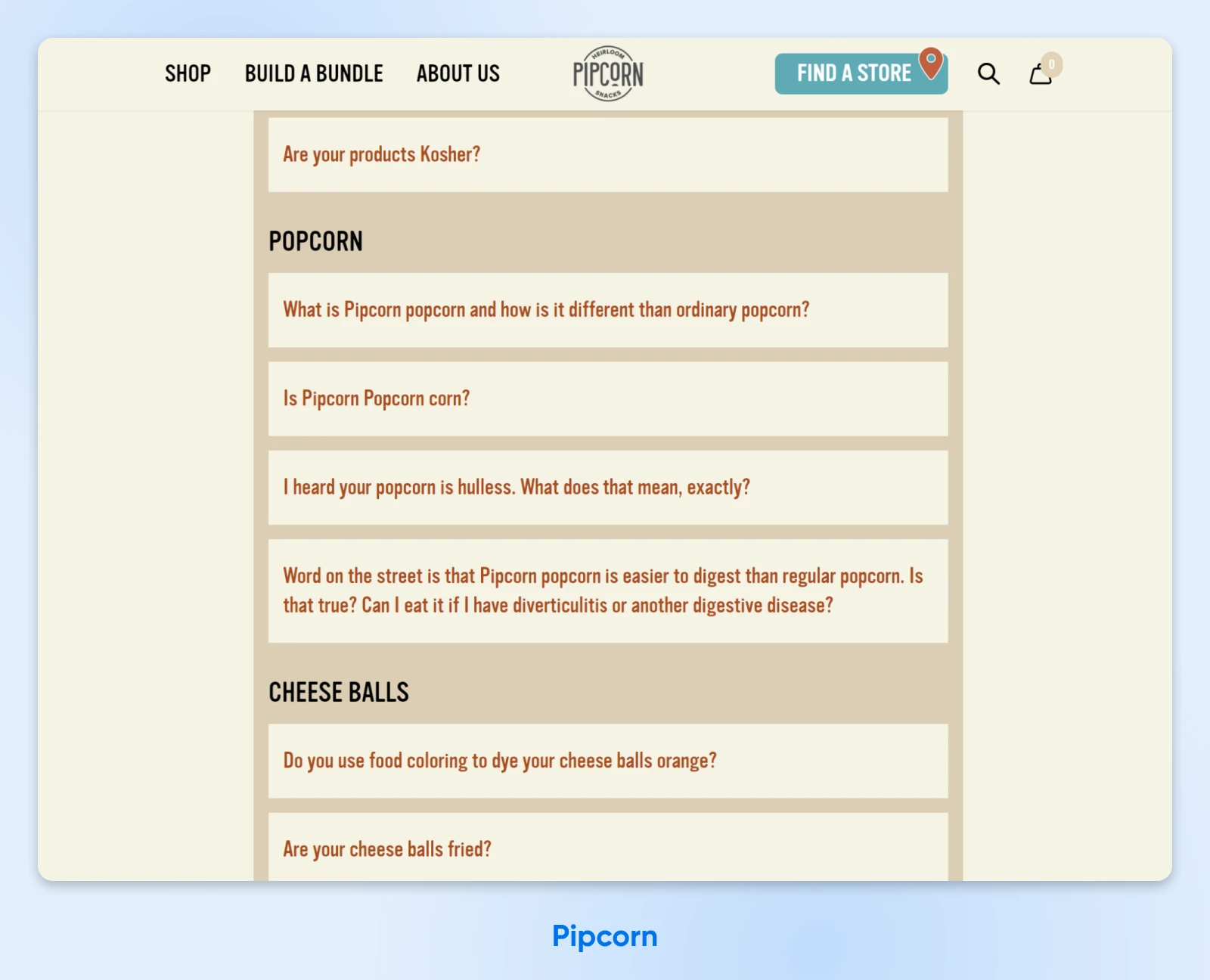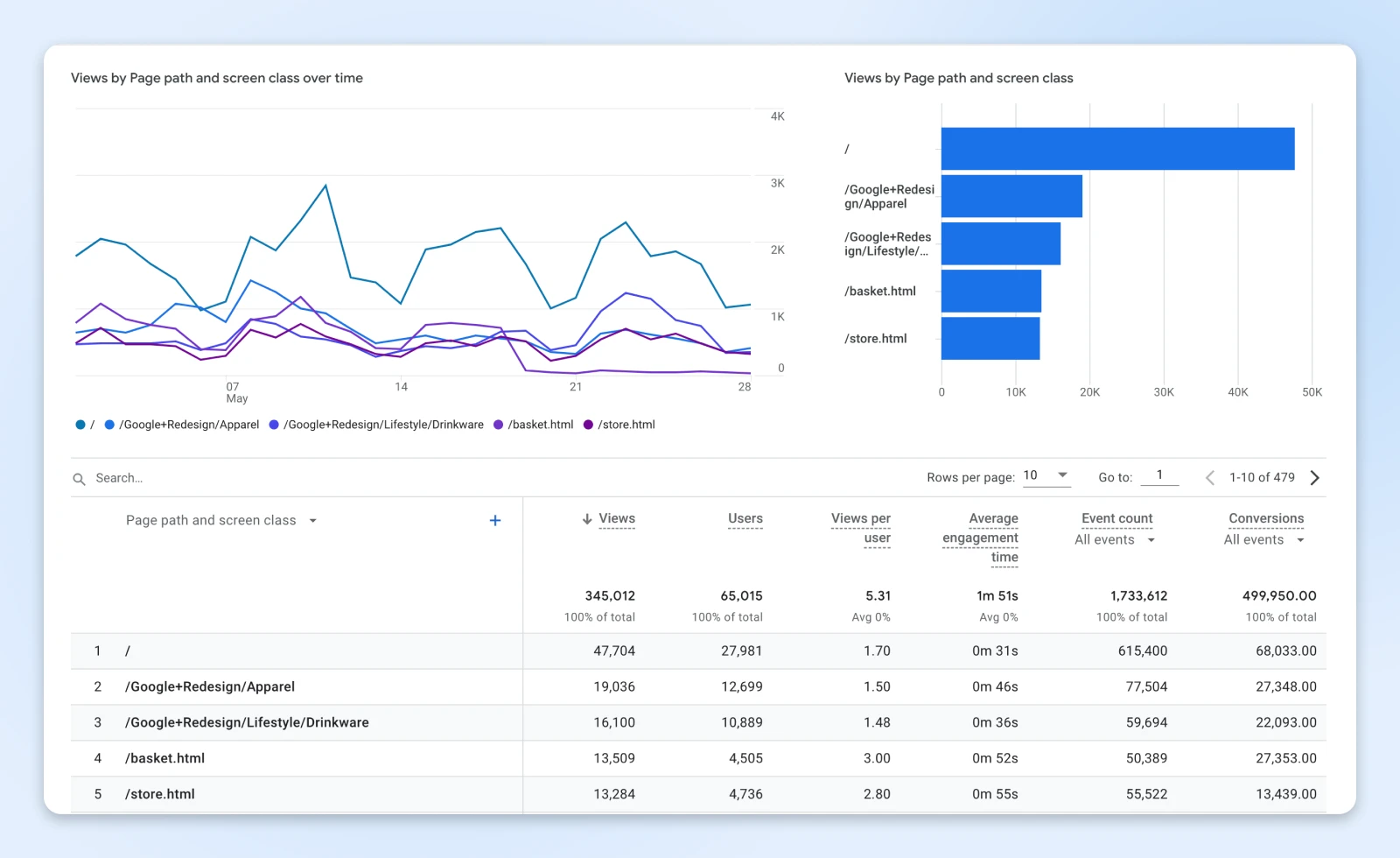Feel like your creative well has run dry?
Hitting a content wall can be incredibly frustrating. You might be staring at a blank page, an empty social media calendar, or a video script that’s going nowhere, and feel like the only solution is to curl up and weep. Listen, it’s happened to me more than once.
But don’t worry — every creative mind faces this challenge at some point. As the famous fantasy writer Phillip Pullman says, “All writing is difficult. The most you can hope for is a day when it goes reasonably easily.”
The good news is that inspiration is all around us! With the right strategies, you can tap into a wealth of fresh ideas for blogs, social media posts, newsletters, videos, and more.
In this guide, we explore why generating new content ideas across different formats is so important. And then, we’ll dive into 24 tips to help you overcome writer’s block and keep the ideas flowing.
You have plenty to say, so let’s get started.
Why Creating New Content Matters
In today’s world, content is more than words on a page. It’s the lifeblood of your online presence, spanning blogs, social media, newsletters, videos, podcasts, and more.
Here’s why keeping your content fresh and diverse is essential:
- It helps you engage your audience no matter where they are: Your audience interacts with content on various platforms. Providing fresh content across all channels keeps them engaged and interested in what you have to offer.
- It builds your brand authority: Consistently delivering valuable content in different formats establishes you as a thought leader in your industry. It shows you’re knowledgeable, innovative, and in tune with the latest trends.
- It boosts your SEO and organic reach: Diverse content types improve your search engine rankings. Search engines favor websites that regularly update their content, and different formats can help you reach new segments of your target audience.
- It helps your business stay relevant over time: Regular updates demonstrate that your business is active and responsive to current trends and customer needs. It reassures your audience that you’re on top of industry developments.

24 Fail-Proof Ways To Come Up With New Content Ideas
We know why it’s so important to create fresh content. Let me share some ways to generate content ideas across various formats.
We’ve got a lot to cover, so let’s get started!
1. Think Beyond Your Blog
While blogs are a staple of content marketing, they aren’t the only way to reach your audience. Explore other formats like:
- Videos: Create tutorials, behind-the-scenes looks, or interviews.
- Podcasts: Discuss industry trends or host guest speakers.
- Infographics and illustrations: Visualize data or processes in an easy-to-digest format.
- Webinars: Offer in-depth discussions or training sessions.
- Social media stories: Share quick updates or engage with your audience in real time.
Different people consume content in different ways. By diversifying your content formats, you cater to various preferences, thereby increasing your reach and engagement.
2. Repurpose Existing Content Across Formats
You can maximize your assets by taking a high-performing piece of content and adapting it to other formats. Here are some ideas to try:
- Blog to video: Turn a popular blog post into a video tutorial.
- Podcast to article: Transcribe podcast episodes into articles. This one is my favorite– for accessibility reasons.
- Webinar to infographic: Summarize key points from a webinar in an infographic.
- Blog to social media series: Break down a comprehensive guide into bite-sized posts.
Repurposing saves time and helps your most valuable content reach audiences who prefer different formats.
3. Batch Your Content Idea Brainstorming Sessions
Coming up with a topic under pressure can be stressful — and the relief you feel when you come up with something might be enough to make you stop for the day. However, you may want to schedule dedicated brainstorming sessions to generate multiple content ideas at once.
Block out a few hours specifically for idea generation. You can even make this a collaborative activity —involve team members to get diverse perspectives.

Batching helps maintain a consistent content schedule and reduces the stress of last-minute idea hunting. So pour some tea, set a timer, and away you go!
4. Tap Into Social Media Trends
Ride the wave of what’s trending right now: use trending topics, hashtags, and challenges as inspiration.
If you’re going to watch social media for content ideas, it’s a good idea to diversify and watch multiple platforms. Keep an eye on Twitter Trends, Instagram’s “Explore,” or TikTok’s “For You” page for maximum ideas. This is a great way for you to create timely content — address current events or viral topics relevant to your industry.
Timely content can increase visibility and engagement, as people are already searching for and discussing these topics.
5. Engage With Your Audience Across Platforms
An audience is often untapped potential for content ideas. If you aren’t looking to them for inspiration, you may be missing out:
- Read comments and messages from your followers: Identify common questions or concerns.
- Conduct polls and surveys: Ask what content they’d like to see.
- Monitor your online reviews: Use feedback from product or service reviews to generate topics.
- Include a call-to-action (CTA) at the end of your posts: Encourage followers to engage to get even more content ideas.
Creating content that directly addresses your audience’s needs fosters loyalty and positions you as a responsive brand.
6. Conduct Interviews or Collaborate with Industry Experts
Your followers might be interested in expert insights from leaders in your industry. Interviews provide valuable content and can be repurposed across formats:
- Look for influencers: Reach out to thought leaders in your industry.
- Prepare engaging questions: Focus on topics your audience cares about.
- Share their thoughts across different channels in different formats: Publish the interview as a blog post, podcast episode, or video.
Expert collaborations can introduce you to new audiences and enhance your credibility in your field. Win-win!
7. Analyze Competitor Content
Study what your competitors are doing and find the gaps in value that you can fill for their audiences.
Start by auditing their content: look at their blogs, videos, podcasts, and social media activity. Identify missing pieces like topics they’ve overlooked or haven’t covered in-depth. Then, offer something better — more comprehensive or updated information.
Understanding the competitive landscape helps you differentiate your content and provide unique value.
8. Use Keyword Research and SEO Tools
Keyword research is a great way to find data-driven content ideas. You can leverage technology tools to find out what your audience is searching for online, such as:
- Google Trends: To identify rising search terms.
- Semrush or Ahrefs: To discover keywords and content gaps.
- AnswerThePublic: To find questions people are asking related to your industry.

SEO tools provide insights into audience interests, helping make your content both, more relevant, and more discoverable.
9. Leverage User-Generated Content
Have you considered giving your audience a chance to shine? Creating your own content isn’t the only option. Incorporate content created by your users, such as testimonials, customer success stories, or reposts of users’ social media photos and videos featuring your products.
You can even run contests to encourage users to create content for a chance to be featured!
User-generated content builds community and provides authentic, relatable material. Just make sure you’re always attributing to the creator, and rewarding them accordingly.
User-Generated Content (UGC)
UGC is any content that customers post on social media to promote a certain brand or business. This might include a review, testimonial, image, or video that features a product on a personal account.
Read More10. Stay Updated With Industry News and Events
When you keep a finger on your industry’s pulse, you may be the first to share big news with your followers. Which, in turn, will encourage your audience to grow and establish you as a trusted voice in your space. That’s why it’s a good idea to stay up-to-date on the latest happenings that might interest your followers — and use them for your own content, by passing along major updates to your audience.
Set up news alerts for industry-related keywords, follow industry leaders, and attend webinars and conferences to gain insights and share learnings. Being timely with news positions you as a go-to source for industry information.
11. Use Content Idea Generators
Need to give your creativity a jump start? When in doubt, use online tools!There are tons of content idea generators out there that can help you come up with content ideas on the fly.
Here are a few to check out:
- HubSpot’s Blog Ideas Generator
- BuzzSumo Content Idea Generator
- Ahrefs’ Free AI Content Idea Generator
The tools can provide you with new perspectives or topics you haven’t considered before.
12. Address Frequently Asked Questions (FAQs)
There’s a good chance your customers or users have questions or problems. And you could help them solve real problems with your content. (Is this a match made in heaven? We think so!)
Create content that answers common questions your audience might have. You can, for instance, gather FAQs from your social media feeds, customer service inquiries, and emails.
Then, develop comprehensive answers to the questions and turn them into guides. You can also turn this into an FAQ section on your website, or create a recurring content series with answers to common questions. Better yet, do both to create even more reach with this one content idea.
As a bonus, answering FAQs improves customer satisfaction and reduces repetitive inquiries for your customer support team.
For example, snack company Pipcorn organizes their FAQs by product type. If you can, make it fun!

13. Share Behind-the-Scenes Content
There’s an easy way to make your brand seem more relatable and authentic to your audience – Give them a peek into your operations behind the scenes! Here are a few ideas you can try:
- Introduce members of your team: Highlight staff members in profiles on social media or your blog.
- Showcase your processes: Demonstrate how your products are made or services are delivered.
- Show off your company culture: Share events, traditions, or what office life is like day-to-day.
Humanizing your brand fosters trust and strengthens connections with your customers.
14. Host Q&A Sessions or Webinars
A great content idea for getting interactive engagement with your audience online. Host virtual events so they can learn about your company or products or ask questions directly.
Here’s how to get started:
- Collect questions in advance: Use social media or your email list.
- Choose a platform like Facebook or Instagram Live: Or even host a Zoom webinar where customers can join in to hear answers to their questions in real-time.
- Make sure to record the session: This is so you can repurpose it for more content later — like sharing clips on social media, or making a transcript to post on your blog.
Live interactions like this can boost engagement and provide immediate value.
15. Create How-To Guides and Tutorials
Looking for some good, old-fashioned blog content that will provide value for your readers?
How about a guide or tutorial with step-by-step instructions? Here’s how to do it:
- Identify your audience’s pain point(s): What challenges does your audience face?
- Offer a solution: Provide clear, actionable advice.
- Use multiple formats: Start with a blog post, and then turn your guide into a video or infographic for even more reach.
Educational content positions you as an expert. Plus, it’s highly shareable.
16. Use Analytics To Identify Popular Content
If you’ve already scored some content wins, double down on that success. Check your content metrics like page views, time on page, shares, and comments to see which topics resonate the most with your audience, and identify your top performers.

Then, expand on those topics or update them —create follow-up content or refresh existing pieces. Focusing on what’s already working maximizes your efforts and audience satisfaction.
17. Explore Related Industries for Crossover Topics
Looking to other industries can help you broaden your content horizons. Look beyond your immediate niche to identify places where your content can overlap with new topics —how does your industry intersect with others?
You might also think about collaborating with experts from related fields, or even creating hybrid content by combining your insights for unique new perspectives.
Crossover content can attract new audience segments and spark innovation.
18. Curate Content From Trusted Sources
A tried-and-true way to generate content ideas is to become a resource hub for your audience. Share valuable content created by others by creating weekly or monthly roundups of must-read articles or adding commentary to provide context to curated content.
Some trustworthy sources to go for content you can share include:
- Industry newsletters
- Academic studies and other peer-reviewed research
- Industry conferences and events
- Reputable news sources and journalists
Just make sure to always acknowledge the original creators of the content you curate and give them proper credit for their work.
19. Explore Visual Content Ideas
Visual content can capture an audience’s attention faster and more effectively than written content. Also, visuals can enhance understanding and engagement. Some formats you might want to experiment with include:
- Infographics: Can be used to simplify complex information.
- Memes and GIFs: Can add humor and relatability to various topics.
- Slide decks: Can share large amounts of information in visually appealing ways.
Not only is visual content more engaging, but it’s often more shareable; so keep that in mind, too.
20. Tell Stories
It’s highly unlikely that you’re the only person creating content in your niche. Think about why your audience follows you. Chances are, it’s because they like you, and would enjoy learning more about the human behind the business.
Storytelling is a great way to make an impact and connect emotionally with your audience. Best of all, since you’re pulling from your experience, there’s no research required.
Here are a few suggestions for personal stories:
- Customer journeys: For example, success stories from people who have used your product or service.
- Brand origin story: Tell your audience about what led to the launch of your business.
- Mission and values stories: Highlight what drives your company and why you do the work you do.
Payroll and HR platform, Gusto, regularly features customers as a part of their content strategy.

How you share your story is as personal as the story itself. You may want to write a narrative or simply list lessons you’ve learned over the years.
Or, how about letting your audience ask you questions on a Twitter chat or YouTube livestream?
21. Brainstorm With Your Team
One of the best ways to keep the well of content ideas from running dry is to collaborate with others and involve them in the content creation process.
- Hold creative brainstorming sessions with your team: This is a great way to encourage open idea sharing.
- Include team members from different departments: Get a diverse range of perspectives involved in adding content ideas to your calendar or list.
- Use physical or digital idea boards: Collect ideas so everyone has a visual while they work.
Collaboration can lead to innovative ideas you might not have generated alone, so getting your team involved can help keep the idea process moving forward in new and productive ways.
22. Address Common Misconceptions From Your Audience
You can find a lot of good content ideas by educating your audience. If you stop to think about things your customers or users don’t know, you can likely name several off the top of your head —and so can a lot of other people in your company.
Content is a great vehicle for clearing up your audience’s misconceptions. You can identify common myths in your industry and use data and expert opinions to debunk them. You can also use content on different platforms (especially social media),to engage in a dialogue where you encourage questions and discussions.
This type of content tends to work well because educating followers builds their trust and positions you as a reliable source.
23. Create a Series or Themed Content
There are many benefits to creating a content series. For one, it allows you to get multiple pieces of content out of just one idea. And two, it keeps your audience engaged over time, coming back to your site or social media over and over for new installments.
The hard part, though, is developing content that spans multiple installments that keep your audience’s attention over time. Here are some ideas to try out:
- Create a weekly tip series: Offer a new tip each week.
- Write content that has monthly themes: Focus on a specific topic each month and build your whole editorial calendar around it.
- Develop story arcs that continue throughout your content: Build narratives over several pieces.
Series encourage repeat engagement and can build anticipation that keeps visitors coming back for more.
24. Keep a Running Idea Journal
As any content creator knows, coming up with ideas is only the first part of the battle. The next step is to put them into action.
But to do that, you have to remember them.
Never miss a spark —document your content ideas as they come to you by using note-taking apps like Evernote or Google Keep or storing ideas in voice memos so you can record your thoughts on the go.
Capturing ideas in the moment ensures you have a reservoir to draw from later. Just be sure to regularly review your content idea bank. Set time aside to go through your notes to organize your good ideas and clean out your not-so-good ones.
Blog Post Ideas Made Easy
Consistently coming up with new content ideas can be one of the more stressful aspects of running an online business. But overcoming writer’s block isn’t about forcing creativity —it’s about tapping into the wealth of resources and strategies available to reignite your inspiration.
By thinking beyond traditional formats and actively engaging with your audience across multiple platforms, you’ll discover that content ideas are virtually limitless. Remember, the key is to stay curious, be proactive, and keep your audience’s interests at the forefront of your content strategy. Besides better traffic and increased profits, content creation is how you build a community and engage with your customers.
Developing new content does require time and energy, but you don’t have to do it alone. With DreamHost’s reliable hosting solutions, you can focus on creating amazing content while we take care of the technical details. Our shared hosting plans are designed to empower entrepreneurs and small business owners like you to build, manage, and optimize your online presence.
Explore our hosting plans today and start reaching your audience like never before.
Ready to bring your fresh content ideas to life?


